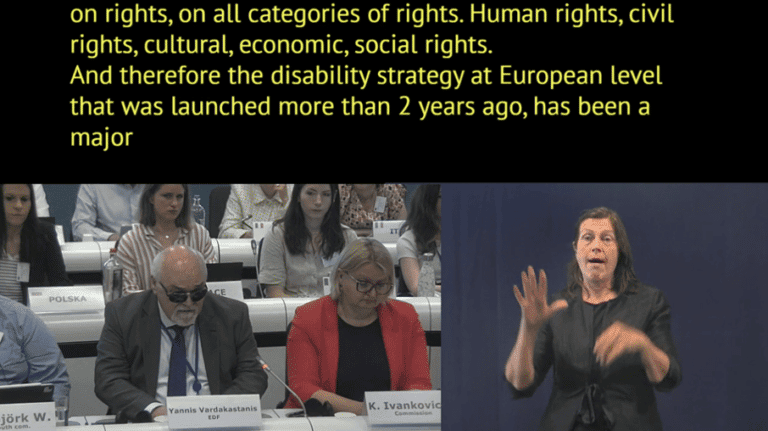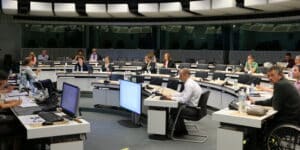On 27th June 2023, EUD attended the seminar “A Union of Equality – Disability Rights and Strategies” held by the Swedish government and the European Commission (Commission). The seminar was organised during the Swedish Presidency of the Council of the European Union 2023 to highlight and raise awareness of the EU Disability Rights Strategy 2021-2030, as well as other disability strategies from EU Member States and to facilitate the important exchange of knowledge and experiences.
Ms Katarina Ivankovic Knezevic, Director of the Directorate General for Employment, Social Affairs and Inclusion (DG EMPL) of the Commission, introduced the event, referring to the EU Disability Rights Strategy as an essential tool to support the implementation of United Nations Convention on the Rights of Persons with Disabilities (CRPD). Following this, a video from the European Commissioner for Equality, Ms Helena Dalli was shown. Ms Dalli highlighted the EU’s progress with regards to achieving a true Union of Equality, having expanded its Disability Rights Strategy by building the AccessibleEU Centre and by submitting a legal proposal for the European Disability Card in September, which will be legally binding.
Mr Yannis Vardakastanis – President of the European Disability Forum (EDF), stressed the disproportionate effects on persons with disabilities of the Covid-19 pandemic and Russia’s war of aggression in Ukraine, coupled with the high inflation rates. As a result, persons with disabilities are experiencing exclusion, discrimination and poverty. However, Mr Vardakastanis also took time to praise the positive progress being made in the EU, such as with the upcoming proposal for an EU Disability Card in September 2023, as well as the development of the AccessibileEU Centre. Nevertheless, the Strategy of Disability Rights is still in the early stages and there are still many gaps to fill. Ms Catherine Naughton, Director of the European Disability Forum (EDF), insisted on the importance of taking an intersectional approach when working to fill the remaining gaps existing for persons with disabilities in society.
The first session on the Human Rights Model on Disability – Mainstreaming Accessibility, Gender Equality and Child’s Rights Perspectives focused on the causes of exclusion such as gender, age, disability, race, political opinion, migration or refugee status. In this regard, the UN Committee on the Elimination of Discrimination against Women (CEDAW), which was established in 1979, was highlighted. Indeed, still today the sexual and reproductive rights of women and girls are not ensured. For instance, the forced sterilization of women and girls with disabilities is still legal in many EU countries. This session called for women and girls with disabilities, including deaf women and girls, not to be left behind.
Finally, there was a session on inclusive elections and political participation. This session looked at the last year before the 2024 European elections. Mr Alejandro Moledo, Deputy Director, European Disability Forum, highlighted the legal barriers associated with this issue – only 13 countries uphold the legal right to vote for persons with disabilities. Moreover, even less countries allow for the right to stand as candidate for persons with disabilities. Secondly, Mr Moledo referred to the practical barriers, such as accessibility (of information/communication/facilities/materials), reasonable accommodation, provision of assistive technologies, national sign languages, and free choice of assistance. Ms Pirkko Mahlamäki, of the Finnish Disability Forum, echoed Mr Moledo’s statement about the need to ensure the accessibility of communication and information with regards to the European elections, mentioning the need for the guidance to be made available in national sign languages.
In this session, EUD Executive Director, Mr Mark Wheatley, made an intervention about thebarriers for deaf people, which are to do with communication. Mr Wheatley stressed the need for each EU Member State to ensure that deaf people are able to participate fully in the elections. Mr Wheatley also mentioned that EUD has received funding from the European Parliament which serves to encourage deaf people in the EU, to participate in the elections (the project is called ADPA-EED). However, he held that this should not be EUD’s responsibility, but rather it is the responsibility of each Member State to ensure accessibility via all the national sign languages of the EU.
EUD will continue to monitor the progress of the EU Disability Rights Strategy, as well as to support its member organisations – National Associations of the Deaf – to implement the CRPD at the national level from the deaf perspective. EUD’s main advocacy aims of the coming months include ensuring the proposal for an EU Disability Card includes all our recommendations, that the EU Parliament Committee on Petitions (PETI) unblocks our petition no. 1056/2016, and finally, but most importantly, that the EU grants legal recognition to all its 31 national sign languages at the EU level.











